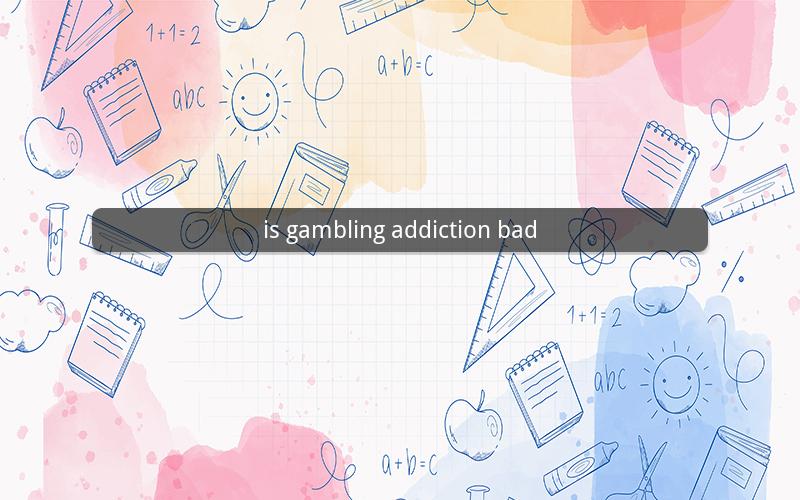
Table of Contents
1. Understanding Gambling Addiction
2. The Negative Impacts of Gambling Addiction
1. Financial Consequences
2. Emotional and Psychological Effects
3. Social and Family Relationships
4. Health Risks
3. Recognizing the Signs of Gambling Addiction
4. Treatment Options for Gambling Addiction
1. Therapy and Counseling
2. Support Groups
3. Medication
5. Preventing Gambling Addiction
6. Conclusion
1. Understanding Gambling Addiction
Gambling addiction, also known as problem gambling, is a condition characterized by an uncontrollable urge to gamble, despite the negative consequences. It is a type of addictive behavior that can affect individuals of all ages, genders, and socioeconomic backgrounds. While some individuals may gamble responsibly, others may develop an addiction that can have severe and long-lasting effects on their lives.
2. The Negative Impacts of Gambling Addiction
Gambling addiction can have a wide range of negative impacts on an individual's life, including:
2.1 Financial Consequences
One of the most significant consequences of gambling addiction is financial. Individuals with this condition may spend vast amounts of money on gambling, leading to financial difficulties, debt, and even bankruptcy. This can also have a ripple effect on their families, causing financial stress and strain.
2.2 Emotional and Psychological Effects
Gambling addiction can also have significant emotional and psychological effects on individuals. Those with this condition may experience anxiety, depression, and mood swings. They may also develop a sense of guilt and shame, as well as a lack of self-esteem.
2.3 Social and Family Relationships
Gambling addiction can also have a negative impact on an individual's social and family relationships. They may become isolated, distant, and less engaged with loved ones. This can lead to strained relationships, conflicts, and even divorce or separation.
2.4 Health Risks
Gambling addiction can also pose health risks to individuals. Those with this condition may experience physical symptoms such as headaches, insomnia, and stomachaches. In addition, the stress and anxiety associated with gambling addiction can lead to more serious health issues, such as heart disease and stroke.
3. Recognizing the Signs of Gambling Addiction
Recognizing the signs of gambling addiction is crucial for early intervention and treatment. Some common signs include:
- Spending increasing amounts of time and money on gambling
- Lying to family, friends, or employers about gambling activities
- Borrowing money or selling personal possessions to fund gambling
- Feeling restless or irritable when unable to gamble
- Continuing to gamble despite negative consequences
4. Treatment Options for Gambling Addiction
There are several treatment options available for gambling addiction, including:
4.1 Therapy and Counseling
Therapy and counseling are effective treatment options for gambling addiction. Cognitive-behavioral therapy (CBT) is particularly helpful, as it can help individuals identify and change the thoughts and behaviors that contribute to their addiction.
4.2 Support Groups
Support groups, such as Gamblers Anonymous, can provide individuals with a sense of community and support. These groups offer a safe space for individuals to share their experiences, learn from others, and develop coping strategies.
4.3 Medication
In some cases, medication may be used to treat gambling addiction. Antidepressants and anti-anxiety medications may help manage the symptoms of depression and anxiety associated with this condition.
5. Preventing Gambling Addiction
Preventing gambling addiction is crucial for maintaining a healthy and balanced life. Some tips for preventing gambling addiction include:
- Setting a budget for gambling activities
- Avoiding gambling venues or websites that are known for their addictive nature
- Seeking help if you or someone you know is struggling with gambling addiction
6. Conclusion
Gambling addiction is a serious condition that can have a profound impact on an individual's life. Understanding the negative impacts of this condition, recognizing the signs, and seeking appropriate treatment are essential for overcoming gambling addiction. By taking proactive steps to prevent and address gambling addiction, individuals can maintain a healthy and balanced life.
Questions and Answers
1. What are the main financial consequences of gambling addiction?
- The main financial consequences of gambling addiction include debt, bankruptcy, and financial strain on families.
2. Can gambling addiction lead to emotional and psychological problems?
- Yes, gambling addiction can lead to anxiety, depression, mood swings, and a lack of self-esteem.
3. How can gambling addiction affect social and family relationships?
- Gambling addiction can lead to strained relationships, conflicts, and even divorce or separation.
4. What are some common signs of gambling addiction?
- Common signs of gambling addiction include spending increasing amounts of time and money on gambling, lying about gambling activities, and feeling restless when unable to gamble.
5. What types of therapy are effective for treating gambling addiction?
- Cognitive-behavioral therapy (CBT) is particularly effective for treating gambling addiction.
6. Can support groups help individuals with gambling addiction?
- Yes, support groups such as Gamblers Anonymous can provide individuals with a sense of community and support.
7. Are there any medications available to treat gambling addiction?
- Yes, antidepressants and anti-anxiety medications may be used to treat the symptoms of depression and anxiety associated with gambling addiction.
8. How can individuals prevent gambling addiction?
- Individuals can prevent gambling addiction by setting a budget, avoiding addictive gambling venues, and seeking help if they are struggling with gambling addiction.
9. Can gambling addiction lead to physical health problems?
- Yes, gambling addiction can lead to physical symptoms such as headaches, insomnia, and stomachaches.
10. What is the most important step in overcoming gambling addiction?
- The most important step in overcoming gambling addiction is recognizing the problem and seeking appropriate treatment and support.